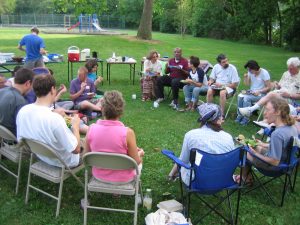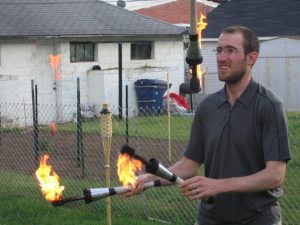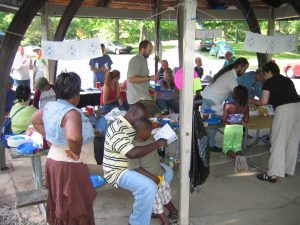Flash mobs are large groups of people who assemble suddenly in a public place to perform an unexpected action, and then quickly disperse. For example, here's a mob hitting New York City:
Flash mobs are interesting to me for a few reasons:
Flash mobs are large groups of people who assemble suddenly in a public place to perform an unexpected action, and then quickly disperse. For example, here's a mob hitting New York City:
Flash mobs are interesting to me for a few reasons:
Journalist Amy Goodman, along with two other members of her crew, were roughed up and arrested at the Republican National Convention despite clearly displaying their press credentials. Other journalists hoping to provide media coverage of the convention and the protests around it were pre-emptively arrested before it even began. And of course, many other people attempting to protest peacefully at both major-party conventions were rounded up, assaulted, arrested and more. For anyone who still had some shred of hope that the media have the ability (let alone the interest) to cover actions and speech that dissent from the mainstream, these incidents may not leave you with much hope left.
Here's an interview PBS did with Goodman about her arrest, including video from the scene: Continue reading "Arresting journalists, preventing protest"
 Like many people of diverse political affiliations, I bristled during the Republican National Convention when various speakers including VP candidate Sarah Palin made fun of "community organizer" as a worthwhile way of spending time.
Like many people of diverse political affiliations, I bristled during the Republican National Convention when various speakers including VP candidate Sarah Palin made fun of "community organizer" as a worthwhile way of spending time.
It wasn't problematic for me because the attack was being used against candidate Barack Obama, although I didn't find it to be an effective or useful expression of concern about his qualifications. Instead, I think that it was just plain insulting to the many people in communities across the world who devote their time and energy to making their local communities better places to live. Further, I think it was a hypocritical and problematic assertion given some of the other selling points being used to present Palin and McCain to voters. Here's why: Continue reading "Making fun of Community Organizers"
Until I watched the PBS Frontline documentary On Our Watch, I had only a very general awareness of what people meant when they talked about the conflict in the Darfur region of Sudan. It is sobering and sad to know that that even with all of the news and pseudo-news I follow and the "think globally" circles I travel in, it's still possible to not really know the details of a genocide that has gone on since 2003, killing over 200,000 people and forcing the relocation or outright flight of another 2.5 million people.
If you're more apt to learn and benefit from an hour-long video than you are from 240 Kilobytes of text on Wikipedia, then I commend On Our Watch to you as a great overview of the issue - you can watch it for free online. It covers the origins of the conflict, the horribly lacking role of the United Nations, and the oil interests, global economic interdependencies, and cover-your-ass politics that have allowed other international players, including the U.S., to stand idly by.
Continue reading "Darfur Genocide, On Our Watch"
 I thoroughly enjoyed this post by Dave Pollard: Need Less.
I thoroughly enjoyed this post by Dave Pollard: Need Less.
The essence of radical simplicity, of the gift/generosity economy, of natural community, and of natural entrepreneurship, I think, is needing less. Needing less makes us, as individuals, members of enterprises, communities and societies, more self-sufficient, and more resilient, and allows us to give more with the 'excess' time, energy and money that we have by virtue of needing less.
Dave goes on to list a few ways that needing less in everyday life might manifest itself. Perhaps obvious to some, overly abstract to others...a pleasant reminder for me.
 These numbers came into my inbox today:
These numbers came into my inbox today:
(Sources: US Dept. of State; The End of Poverty; Congressional Research
Service)
When I was in College, where I learned that world-views which can be expressed on hip bumper stickers are the ones you really want to internalize and live by, I saw one that said "If you're not outraged, you're not paying attention." I really liked it at the time, because it highlighted the curious and nearly universal practice of going about our daily lives while really awful, horrible, disgusting things are happening all around us.
Continue reading "On being outraged and paying attention"
 It's a privilege to volunteer in one's community. In one sense it's literally a privilege of having the time and means to say "I'm doing okay enough in my own life that I want to share some of my energy in service to the lives of others." In another sense, it's a privilege of publicly holding up what's important to us, a way of honoring our own roles in a community and the value that it has to us. My involvement in the Wayne County area is a way of showing not only my own interest in making it a better place for me and my loved ones to live, but also a way of making a commitment to the lives and needs of those who I don't know that well, who I can't necessarily relate to, who will be here long after I'm gone.
It's a privilege to volunteer in one's community. In one sense it's literally a privilege of having the time and means to say "I'm doing okay enough in my own life that I want to share some of my energy in service to the lives of others." In another sense, it's a privilege of publicly holding up what's important to us, a way of honoring our own roles in a community and the value that it has to us. My involvement in the Wayne County area is a way of showing not only my own interest in making it a better place for me and my loved ones to live, but also a way of making a commitment to the lives and needs of those who I don't know that well, who I can't necessarily relate to, who will be here long after I'm gone.
Continue reading "On volunteering"
Wednesday night I attended a screening of The Ambassador, a documentary about John Dimitri Negroponte, currently the U.S. Director of National Intelligence and formerly U.S. ambassador to Honduras, the United Nations and Iraq. Negroponte has been a controversial figure due to his involvement in the Iran-Contra Affair and human rights violations in Honduras, and the film took on those controversies by documenting Negroponte's career as a diplomat, his public and private statements about the accusations made against him, and the forces that influenced his path all along.
Continue reading "The Ambassador"
The Richmond Palladium-Item newspaper seems to have multiple personalities when it comes to characterizing the nature of civil protest. In Friday's editorial, they so nobly say "It's our right to stand up for our beliefs, tell our elected officials we disagree, share our viewpoints with neighbors, family and friends, strive for the betterment of our country as a whole. That right brings with it a responsibility to respect others' ideas, hear out their concerns and try at the very least to understand our differences." The article then proceeds to condemn any protest that violates the law, indicating there is some concept of "vital" and "proper" protest, of which illegal acts are not a part. I suppose, then, that they would have had to condemn the entire U.S. civil rights movement, the actions of fellow journalists who disobey the law to protect sources, and a slew of other "improper" protests throughout the history of our country. (Perhaps they misunderstand that sometimes acting improperly is, unfortunately, the only way to draw attention to a cause, for better or worse.) But surely, then, the above statement means they do support and respect legal and peaceful acts that share viewpoints, encourage dialogue about our beliefs, and work to change our communities for the better, right? Like a written petition, maybe? Apparently not - they would call such actions "misguided" and "desperate" and "an affront to civic fair play", and go on to equate those actions with physical assault.
Wow. If I understand their position correctly as derived from their various published statements, the only kind of disagreement that is proper or fair is no real disagreement at all. It's sad and scary that a local institution that is theoretically so much a part of facilitating free speech and dialogue about the community - even when it involves acts of protest - seems to so manifestly misunderstand those opportunities, and the vehicles available for engaging in them.
The assignment given for my New Testament course was to "write a biblical parable."
 What I came up with is obviously not a parable in the traditional sense, but I like to think of it as the parable of parables; it is the story of a common theme that runs throughout the literature of the biblical time and that represents a fundamental (or at least well-established) part about how our society tends to work. In that sense it is a story that evokes a deeper meaning from itself when examined closely in relation to our own lives, as does a parable in its purer form.
What I came up with is obviously not a parable in the traditional sense, but I like to think of it as the parable of parables; it is the story of a common theme that runs throughout the literature of the biblical time and that represents a fundamental (or at least well-established) part about how our society tends to work. In that sense it is a story that evokes a deeper meaning from itself when examined closely in relation to our own lives, as does a parable in its purer form.
He began to talk, in public and in private, about the problems and about the fundamental causes and possible solutions. He would sometimes end up with large groups of people gathered around him as he talked. Though he had many followers who believed in his cause, he only had a few that he considered his true friends and true believers. Besides, it was becoming dangerous for him and his followers to talk about the problems any more because there were many who opposed his views or said that he had no right in the first place to address the problems because of who he was. After a while, his following and support got so large that it seemed he was actually making a difference. People were actually beginning to catch on to what he was saying, and at the same time becoming less accepting of those who caused the problems or who had oppressed their existence. Finally, his enemies decided that his words were too dangerous because they addressed deeply buried problems that, to face, would shake the very foundations of the world built on top of them.
He was tried and convicted by the attitudes of his time and by the prejudices of his enemies, and so they plotted to kill him as punishment. They did so, quietly and quite normally with the typical sort of lynching. He died, and in a fairly short time, the mission and movement that he had created did not have enough forward motion to sustain itself, and it died fairly soon thereafter.
This is the story of Jesus Christ. This is the story of Martin Luther King, Jr. This is the story of the poor and homeless person who fights daily to find a home and raise a family. This is the story of Medgar Evers, of Malcom X, of any man and woman that has ever stood up for what they believed in because they could do no other. This is the story and the song of the suffering servant.